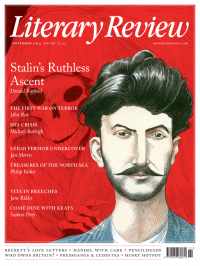Joanna Bourke
Surrender Junkies
Cowardice: A Brief History
By Chris Walsh
Princeton University Press 292pp £19.95
In October 1964, audiences all over America gathered to watch a film entitled The Americanization of Emily. Directed by Arthur Hiller, it starred celebrated movie personalities Julie Andrews (playing Emily, who enjoys living a decadent, ‘American’ lifestyle), James Garner, Melvyn Douglas and James Coburn. The film is a playful defence of cowardice.
Set in wartime London in 1944, its main male character, Lieutenant Commander Charles E Madison (played by Garner), is proud to admit that he is a ‘practising coward’. He is defiant, stating that cowardice is ‘my new religion. I’m a big believer in it. Cowardice will save the world.’ How? Cowards ‘don’t fight wars. They run like rabbits at the first shot. If everyone obeyed their natural impulse and ran like rabbits at the first shot, I don’t see how we could possibly get to the second shot.’ Predictably, he wins Emily’s love in the end, but only because of an act of moral cowardice.
For a light comedy, The Americanization of Emily is surprisingly complex, so I found it helpful to turn to Chris Walsh’s Cowardice: A Brief History for guidance on the subject at its heart. From the most despicable souls flailing about in Dante’s Inferno to terrorists caricatured as spineless fools, cowards

Sign Up to our newsletter
Receive free articles, highlights from the archive, news, details of prizes, and much more.@Lit_Review
Follow Literary Review on Twitter
Twitter Feed
Under its longest-serving editor, Graydon Carter, Vanity Fair was that rare thing – a New York society magazine that published serious journalism.
@PeterPeteryork looks at what Carter got right.
Peter York - Deluxe Editions
Peter York: Deluxe Editions - When the Going Was Good: An Editor’s Adventures During the Last Golden Age of Magazines by Graydon Carter
literaryreview.co.uk
Henry James returned to America in 1904 with three objectives: to see his brother William, to deliver a series of lectures on Balzac, and to gather material for a pair of books about modern America.
Peter Rose follows James out west.
Peter Rose - The Restless Analyst
Peter Rose: The Restless Analyst - Henry James Comes Home: Rediscovering America in the Gilded Age by Peter Brooks...
literaryreview.co.uk
Vladimir Putin served his apprenticeship in the KGB toward the end of the Cold War, a period during which Western societies were infiltrated by so-called 'illegals'.
Piers Brendon examines how the culture of Soviet spycraft shaped his thinking.
Piers Brendon - Tinker, Tailor, Sleeper, Troll
Piers Brendon: Tinker, Tailor, Sleeper, Troll - The Illegals: Russia’s Most Audacious Spies and the Plot to Infiltrate the West by Shaun Walker
literaryreview.co.uk